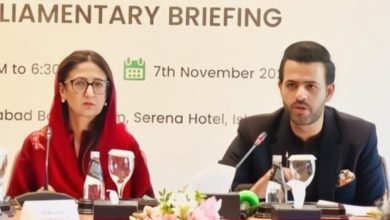Boosting Climate Finance in Pakistan’s Economy

Finance Minister Muhammad Aurangzeb reaffirmed the government’s commitment to prioritising climate change and population management within Pakistan’s economic and fiscal planning at the 28th Sustainable Development Conference organised by the Sustainable Development Policy Institute in Islamabad.
He said the global economy has shown resilience amid uncertainty, but Pakistan must build stronger fiscal and external buffers to withstand potential external shocks driven by rising protectionism and supply chain realignments. Strengthening these buffers, he argued, is essential to secure long-term climate finance and protect vulnerable sectors.
The Minister pointed to recent steps on digital assets, including the creation of the Pakistan Crypto Council and the establishment of the Virtual Asset Regulatory Authority, which is being legislated through Parliament. He stressed that Pakistan’s approach to virtual assets will remain aligned with the country’s risk profile and regulatory priorities, with safeguards to prevent capital flight, money laundering and to ensure investor suitability.
Aurangzeb highlighted significant multilateral support that bolsters Pakistan’s climate and social agenda: $1.3 billion from the IMF under the Resilience and Sustainability Facility, $500 million from the Asian Development Bank, and a 10-year Country Partnership Framework with the World Bank Group that envisages $2 billion annually, focused largely on climate change and population challenges.
Noting that international financing alone is insufficient, he urged mobilisation of domestic resources, private capital and market-based instruments such as green bonds and carbon markets to expand climate finance. The Minister welcomed innovative private sector initiatives, citing Acumen’s $90 million Climate Action Fund and Sindh’s pioneering mangrove carbon credit project as models to be replicated and scaled nationally.
He also highlighted growing opportunities for debt-for-nature swaps and called for enhanced technical capacity to design, structure and monitor bankable climate projects that meet international standards. Building such capacity, he said, would attract private investment and make climate finance more effective and investable for Pakistan’s specific needs.
Aurangzeb underlined the central role of finance ministries in mainstreaming climate action, warning that climate priorities cannot become national policy unless they are integrated into national budgets. Strengthening budgetary alignment with climate objectives, he concluded, is vital for turning commitments into measurable outcomes.




